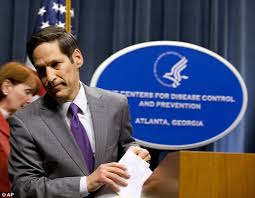The head of the CDC said Saturday that imposing a travel ban between the U.S. and West African countries dealing with the Ebola virus could worsen the outbreak that has killed over 3,000 people in five countries.
“Though we might wish we can seal ourselves off from the world, there are Americans who have the right of return and many other people that have the right to enter this country,” Dr. Thomas Frieden told a press conference. “We’re not going to be able to get to zero risk no matter what we do unless we control the outbreak in West Africa.”
Frieden added that a travel ban could make it difficult to get medical supplies and aid workers to the affected regions in West Africa.
“We really need to be clear that we don’t inadvertently increase the risk to people in this country by making it harder for us to respond to the needs in those countries,” he said, “by making it harder to get assistance in and therefore those outbreaks would become worse, go on longer, and paradoxically, something that we did to try and protect ourselves might actually increase our risk.”
Health officials have ruled out two potential Ebola cases in the Washington D.C. area, with Howard University Hospital in the District and Shady Grove Adventist Hospital in suburban Maryland confirming that patients who had been kept in isolation did not have the virus. A similar scare in New Jersey, when a passenger on a United Airlines flight from Brussels fell ill, also turned out not to be the virus.
Frieden said Saturday that officials are “beginning to see some progress” toward controlling the outbreak, “but it’s going to be a long hard road.”
Frieden said that they’ve already gotten “well over” 100 inquiries on suspicious cases in recent months, with an uptick coming after the Dallas patient was diagnosed. Federal officials have said tests have been done on about 15 and all but one — Duncan — were false alarms.
Most of the cases don’t involve travel to West Africa, “but we’d rather have a wider net cast,” said Frieden. That way “we’re more likely to find someone promptly if they did actually have exposure and they do actually have symptoms,” he said.
The virus that causes Ebola is not airborne and can only be spread through direct contact with the bodily fluids — blood, sweat, vomit, feces, urine, saliva or semen — of an infected person who is showing symptoms.
The first person diagnosed with Ebola in the United Sates went to a Dallas hospital last week but was mistakenly sent home, despite revealing he was visiting from Liberia, before returning by ambulance days later.
“There were things that did not go the way they should have in Dallas,” Dr. Anthony Fauci, infectious diseases chief at the National Institutes of Health, said Friday. “But there were a lot of things that went right and are going right.”
Texas officials now are monitoring 50 people, 10 of whom they consider at high risk, who came into contact with the man, identified as Thomas Eric Duncan. They’ve had to quarantine four of them, and even had problems getting rid of the infectious waste left in the apartment where the patient stayed.
Texas health officials say Duncan is now in critical condition.
Dallas County Judge Clay Lewis Jenkins said during the Saturday press conference that he took the four to a new home where they will be quarantined for 21 days.
Jenkins, the county top elected official, urged Americans to show compassion for them, saying they are deeply concerned about the public’s health and are people “just like in your family.”














